Advocacy Report on Sexting, Online Bullying and Harassment Issues
VerifiedAdded on 2023/04/21
|10
|2189
|312
Report
AI Summary
This report provides an annotated bibliography of six advocacy pieces addressing sexting, online bullying, and harassment. The introduction establishes the report's purpose, focusing on two key issues and presenting advocacy pieces in an annotated bibliography format. Each entry includes a description of the source, an outline or explanation of the content, identified strengths and weaknesses, and connections to relevant philosophies, theories, or ideologies. The report covers diverse topics, including the online harassment of female journalists, the evolving meaning of internet trolling, the alarming number of Americans experiencing online bullying, the concept of consent in sexting, the decriminalization of teen sexting in Australia, and allegations of abuse and sexting involving a musician. The report highlights the strengths and weaknesses of each piece, offering critical analysis and insights into the complexities of these issues. The inclusion of varied perspectives and viewpoints adds depth to the overall analysis.
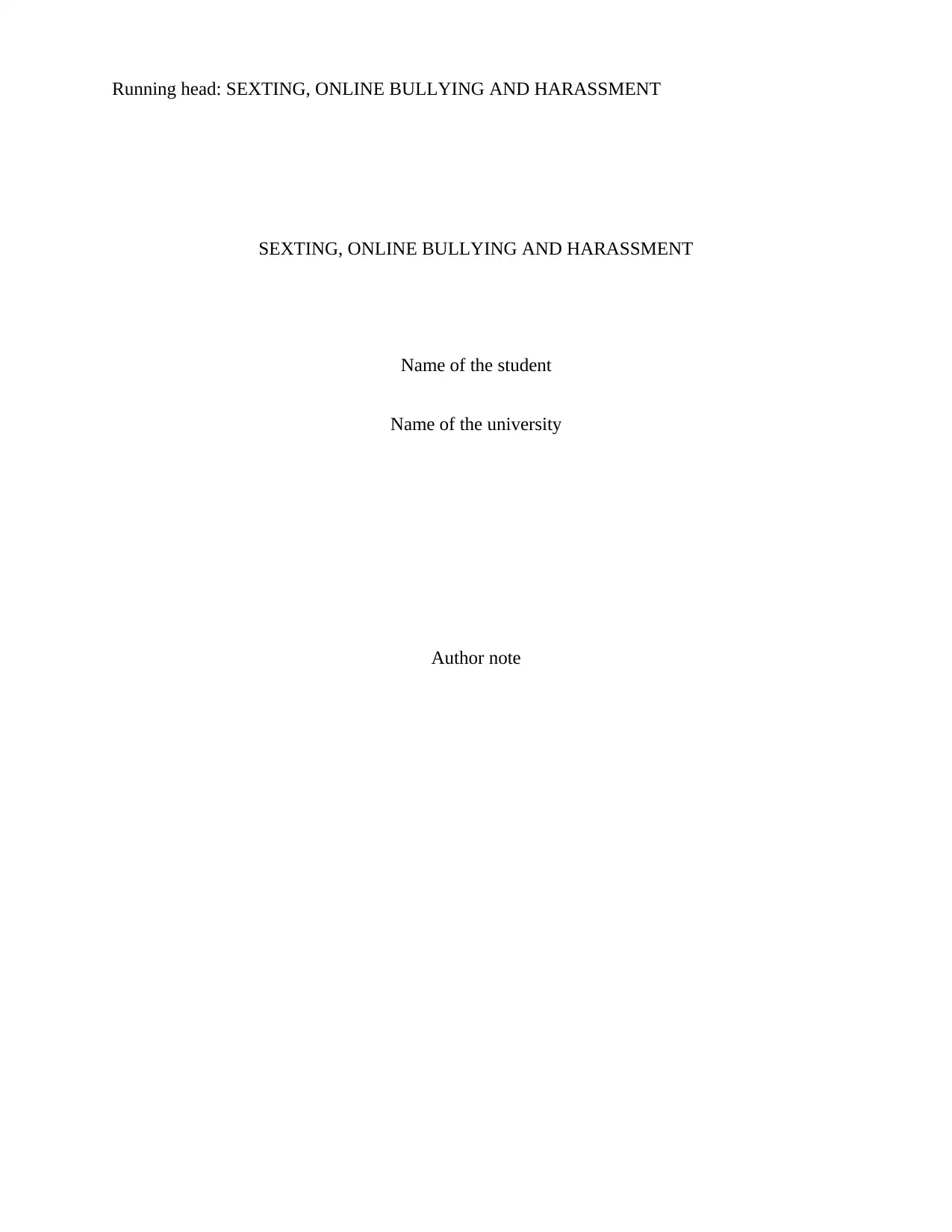
Running head: SEXTING, ONLINE BULLYING AND HARASSMENT
SEXTING, ONLINE BULLYING AND HARASSMENT
Name of the student
Name of the university
Author note
SEXTING, ONLINE BULLYING AND HARASSMENT
Name of the student
Name of the university
Author note
Paraphrase This Document
Need a fresh take? Get an instant paraphrase of this document with our AI Paraphraser
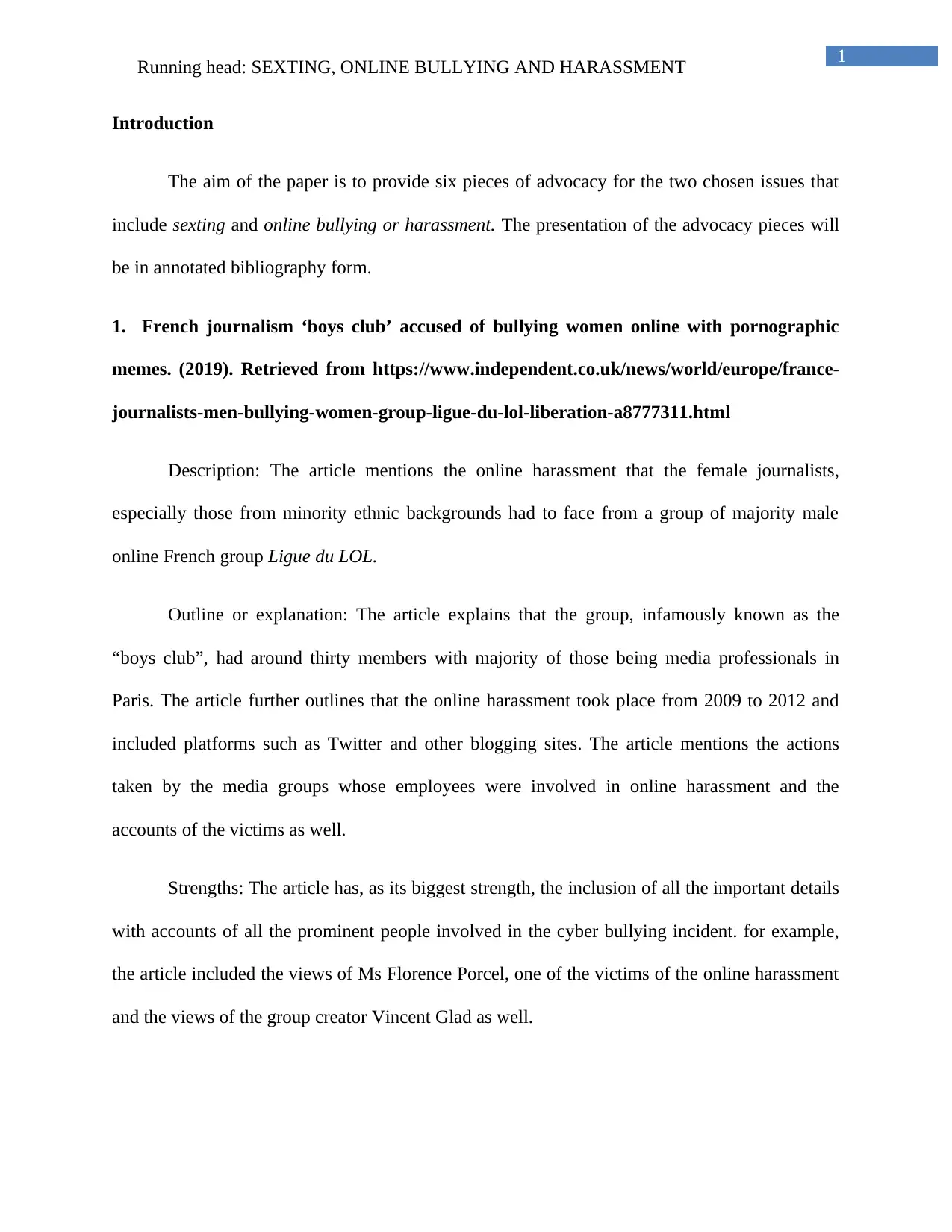
1
Running head: SEXTING, ONLINE BULLYING AND HARASSMENT
Introduction
The aim of the paper is to provide six pieces of advocacy for the two chosen issues that
include sexting and online bullying or harassment. The presentation of the advocacy pieces will
be in annotated bibliography form.
1. French journalism ‘boys club’ accused of bullying women online with pornographic
memes. (2019). Retrieved from https://www.independent.co.uk/news/world/europe/france-
journalists-men-bullying-women-group-ligue-du-lol-liberation-a8777311.html
Description: The article mentions the online harassment that the female journalists,
especially those from minority ethnic backgrounds had to face from a group of majority male
online French group Ligue du LOL.
Outline or explanation: The article explains that the group, infamously known as the
“boys club”, had around thirty members with majority of those being media professionals in
Paris. The article further outlines that the online harassment took place from 2009 to 2012 and
included platforms such as Twitter and other blogging sites. The article mentions the actions
taken by the media groups whose employees were involved in online harassment and the
accounts of the victims as well.
Strengths: The article has, as its biggest strength, the inclusion of all the important details
with accounts of all the prominent people involved in the cyber bullying incident. for example,
the article included the views of Ms Florence Porcel, one of the victims of the online harassment
and the views of the group creator Vincent Glad as well.
Running head: SEXTING, ONLINE BULLYING AND HARASSMENT
Introduction
The aim of the paper is to provide six pieces of advocacy for the two chosen issues that
include sexting and online bullying or harassment. The presentation of the advocacy pieces will
be in annotated bibliography form.
1. French journalism ‘boys club’ accused of bullying women online with pornographic
memes. (2019). Retrieved from https://www.independent.co.uk/news/world/europe/france-
journalists-men-bullying-women-group-ligue-du-lol-liberation-a8777311.html
Description: The article mentions the online harassment that the female journalists,
especially those from minority ethnic backgrounds had to face from a group of majority male
online French group Ligue du LOL.
Outline or explanation: The article explains that the group, infamously known as the
“boys club”, had around thirty members with majority of those being media professionals in
Paris. The article further outlines that the online harassment took place from 2009 to 2012 and
included platforms such as Twitter and other blogging sites. The article mentions the actions
taken by the media groups whose employees were involved in online harassment and the
accounts of the victims as well.
Strengths: The article has, as its biggest strength, the inclusion of all the important details
with accounts of all the prominent people involved in the cyber bullying incident. for example,
the article included the views of Ms Florence Porcel, one of the victims of the online harassment
and the views of the group creator Vincent Glad as well.
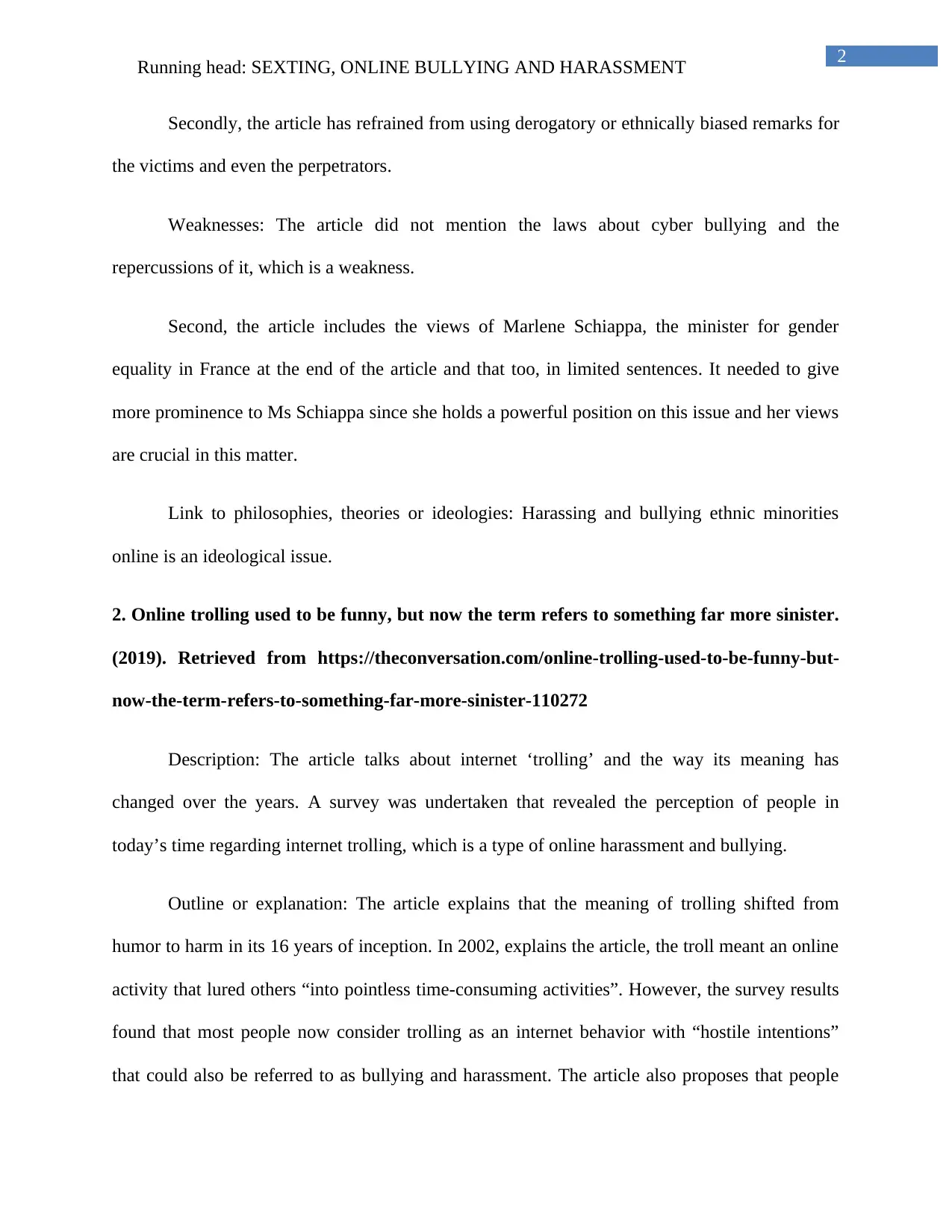
2
Running head: SEXTING, ONLINE BULLYING AND HARASSMENT
Secondly, the article has refrained from using derogatory or ethnically biased remarks for
the victims and even the perpetrators.
Weaknesses: The article did not mention the laws about cyber bullying and the
repercussions of it, which is a weakness.
Second, the article includes the views of Marlene Schiappa, the minister for gender
equality in France at the end of the article and that too, in limited sentences. It needed to give
more prominence to Ms Schiappa since she holds a powerful position on this issue and her views
are crucial in this matter.
Link to philosophies, theories or ideologies: Harassing and bullying ethnic minorities
online is an ideological issue.
2. Online trolling used to be funny, but now the term refers to something far more sinister.
(2019). Retrieved from https://theconversation.com/online-trolling-used-to-be-funny-but-
now-the-term-refers-to-something-far-more-sinister-110272
Description: The article talks about internet ‘trolling’ and the way its meaning has
changed over the years. A survey was undertaken that revealed the perception of people in
today’s time regarding internet trolling, which is a type of online harassment and bullying.
Outline or explanation: The article explains that the meaning of trolling shifted from
humor to harm in its 16 years of inception. In 2002, explains the article, the troll meant an online
activity that lured others “into pointless time-consuming activities”. However, the survey results
found that most people now consider trolling as an internet behavior with “hostile intentions”
that could also be referred to as bullying and harassment. The article also proposes that people
Running head: SEXTING, ONLINE BULLYING AND HARASSMENT
Secondly, the article has refrained from using derogatory or ethnically biased remarks for
the victims and even the perpetrators.
Weaknesses: The article did not mention the laws about cyber bullying and the
repercussions of it, which is a weakness.
Second, the article includes the views of Marlene Schiappa, the minister for gender
equality in France at the end of the article and that too, in limited sentences. It needed to give
more prominence to Ms Schiappa since she holds a powerful position on this issue and her views
are crucial in this matter.
Link to philosophies, theories or ideologies: Harassing and bullying ethnic minorities
online is an ideological issue.
2. Online trolling used to be funny, but now the term refers to something far more sinister.
(2019). Retrieved from https://theconversation.com/online-trolling-used-to-be-funny-but-
now-the-term-refers-to-something-far-more-sinister-110272
Description: The article talks about internet ‘trolling’ and the way its meaning has
changed over the years. A survey was undertaken that revealed the perception of people in
today’s time regarding internet trolling, which is a type of online harassment and bullying.
Outline or explanation: The article explains that the meaning of trolling shifted from
humor to harm in its 16 years of inception. In 2002, explains the article, the troll meant an online
activity that lured others “into pointless time-consuming activities”. However, the survey results
found that most people now consider trolling as an internet behavior with “hostile intentions”
that could also be referred to as bullying and harassment. The article also proposes that people
⊘ This is a preview!⊘
Do you want full access?
Subscribe today to unlock all pages.

Trusted by 1+ million students worldwide
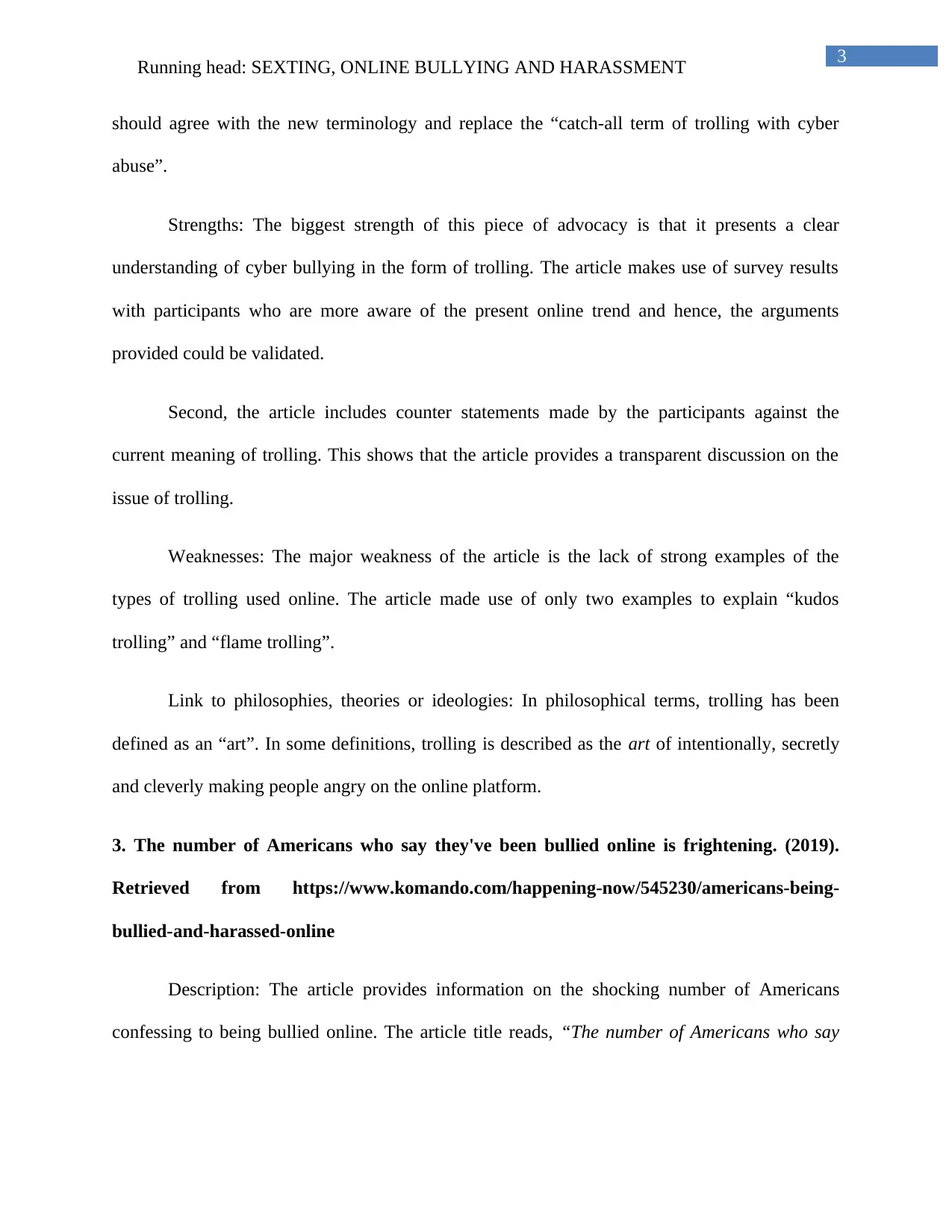
3
Running head: SEXTING, ONLINE BULLYING AND HARASSMENT
should agree with the new terminology and replace the “catch-all term of trolling with cyber
abuse”.
Strengths: The biggest strength of this piece of advocacy is that it presents a clear
understanding of cyber bullying in the form of trolling. The article makes use of survey results
with participants who are more aware of the present online trend and hence, the arguments
provided could be validated.
Second, the article includes counter statements made by the participants against the
current meaning of trolling. This shows that the article provides a transparent discussion on the
issue of trolling.
Weaknesses: The major weakness of the article is the lack of strong examples of the
types of trolling used online. The article made use of only two examples to explain “kudos
trolling” and “flame trolling”.
Link to philosophies, theories or ideologies: In philosophical terms, trolling has been
defined as an “art”. In some definitions, trolling is described as the art of intentionally, secretly
and cleverly making people angry on the online platform.
3. The number of Americans who say they've been bullied online is frightening. (2019).
Retrieved from https://www.komando.com/happening-now/545230/americans-being-
bullied-and-harassed-online
Description: The article provides information on the shocking number of Americans
confessing to being bullied online. The article title reads, “The number of Americans who say
Running head: SEXTING, ONLINE BULLYING AND HARASSMENT
should agree with the new terminology and replace the “catch-all term of trolling with cyber
abuse”.
Strengths: The biggest strength of this piece of advocacy is that it presents a clear
understanding of cyber bullying in the form of trolling. The article makes use of survey results
with participants who are more aware of the present online trend and hence, the arguments
provided could be validated.
Second, the article includes counter statements made by the participants against the
current meaning of trolling. This shows that the article provides a transparent discussion on the
issue of trolling.
Weaknesses: The major weakness of the article is the lack of strong examples of the
types of trolling used online. The article made use of only two examples to explain “kudos
trolling” and “flame trolling”.
Link to philosophies, theories or ideologies: In philosophical terms, trolling has been
defined as an “art”. In some definitions, trolling is described as the art of intentionally, secretly
and cleverly making people angry on the online platform.
3. The number of Americans who say they've been bullied online is frightening. (2019).
Retrieved from https://www.komando.com/happening-now/545230/americans-being-
bullied-and-harassed-online
Description: The article provides information on the shocking number of Americans
confessing to being bullied online. The article title reads, “The number of Americans who say
Paraphrase This Document
Need a fresh take? Get an instant paraphrase of this document with our AI Paraphraser
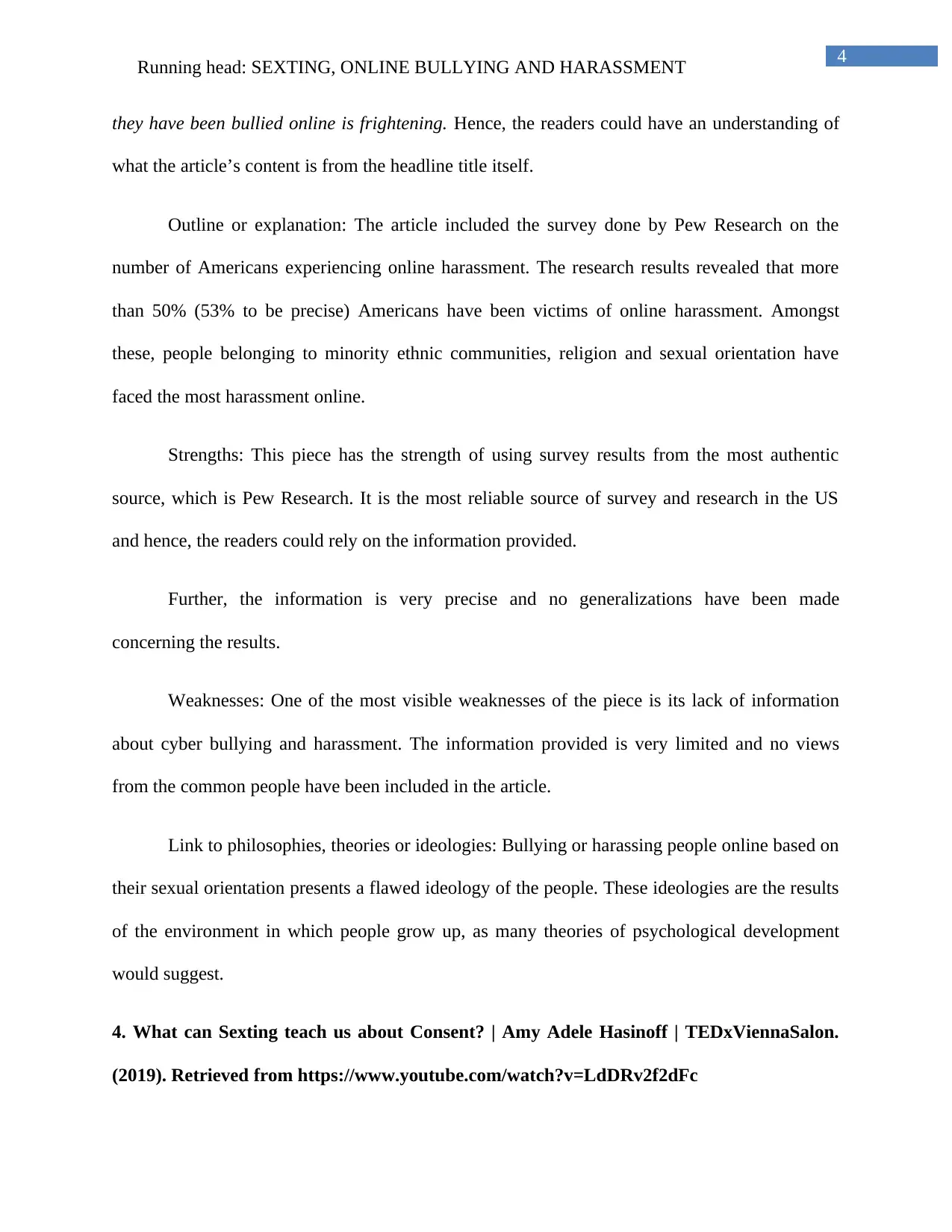
4
Running head: SEXTING, ONLINE BULLYING AND HARASSMENT
they have been bullied online is frightening. Hence, the readers could have an understanding of
what the article’s content is from the headline title itself.
Outline or explanation: The article included the survey done by Pew Research on the
number of Americans experiencing online harassment. The research results revealed that more
than 50% (53% to be precise) Americans have been victims of online harassment. Amongst
these, people belonging to minority ethnic communities, religion and sexual orientation have
faced the most harassment online.
Strengths: This piece has the strength of using survey results from the most authentic
source, which is Pew Research. It is the most reliable source of survey and research in the US
and hence, the readers could rely on the information provided.
Further, the information is very precise and no generalizations have been made
concerning the results.
Weaknesses: One of the most visible weaknesses of the piece is its lack of information
about cyber bullying and harassment. The information provided is very limited and no views
from the common people have been included in the article.
Link to philosophies, theories or ideologies: Bullying or harassing people online based on
their sexual orientation presents a flawed ideology of the people. These ideologies are the results
of the environment in which people grow up, as many theories of psychological development
would suggest.
4. What can Sexting teach us about Consent? | Amy Adele Hasinoff | TEDxViennaSalon.
(2019). Retrieved from https://www.youtube.com/watch?v=LdDRv2f2dFc
Running head: SEXTING, ONLINE BULLYING AND HARASSMENT
they have been bullied online is frightening. Hence, the readers could have an understanding of
what the article’s content is from the headline title itself.
Outline or explanation: The article included the survey done by Pew Research on the
number of Americans experiencing online harassment. The research results revealed that more
than 50% (53% to be precise) Americans have been victims of online harassment. Amongst
these, people belonging to minority ethnic communities, religion and sexual orientation have
faced the most harassment online.
Strengths: This piece has the strength of using survey results from the most authentic
source, which is Pew Research. It is the most reliable source of survey and research in the US
and hence, the readers could rely on the information provided.
Further, the information is very precise and no generalizations have been made
concerning the results.
Weaknesses: One of the most visible weaknesses of the piece is its lack of information
about cyber bullying and harassment. The information provided is very limited and no views
from the common people have been included in the article.
Link to philosophies, theories or ideologies: Bullying or harassing people online based on
their sexual orientation presents a flawed ideology of the people. These ideologies are the results
of the environment in which people grow up, as many theories of psychological development
would suggest.
4. What can Sexting teach us about Consent? | Amy Adele Hasinoff | TEDxViennaSalon.
(2019). Retrieved from https://www.youtube.com/watch?v=LdDRv2f2dFc
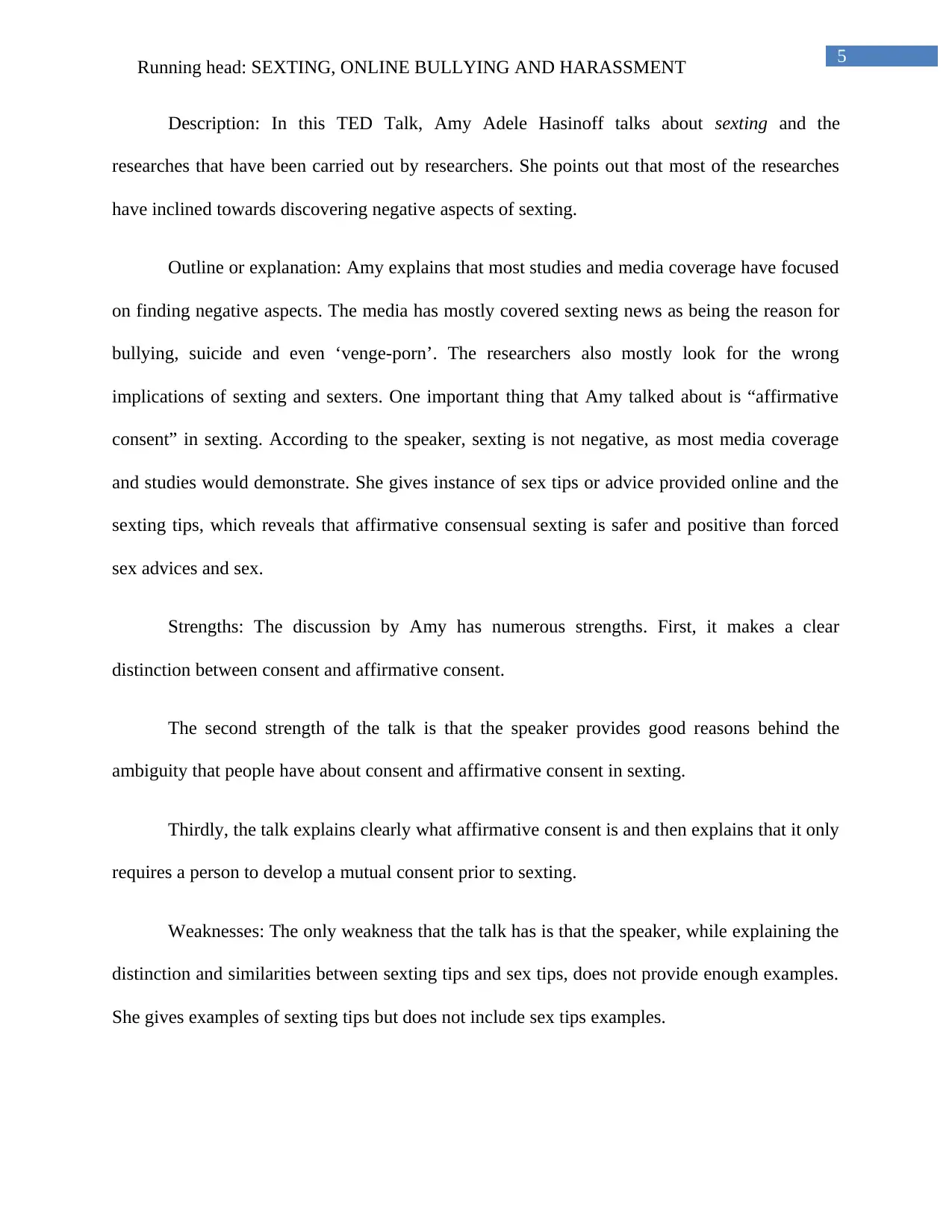
5
Running head: SEXTING, ONLINE BULLYING AND HARASSMENT
Description: In this TED Talk, Amy Adele Hasinoff talks about sexting and the
researches that have been carried out by researchers. She points out that most of the researches
have inclined towards discovering negative aspects of sexting.
Outline or explanation: Amy explains that most studies and media coverage have focused
on finding negative aspects. The media has mostly covered sexting news as being the reason for
bullying, suicide and even ‘venge-porn’. The researchers also mostly look for the wrong
implications of sexting and sexters. One important thing that Amy talked about is “affirmative
consent” in sexting. According to the speaker, sexting is not negative, as most media coverage
and studies would demonstrate. She gives instance of sex tips or advice provided online and the
sexting tips, which reveals that affirmative consensual sexting is safer and positive than forced
sex advices and sex.
Strengths: The discussion by Amy has numerous strengths. First, it makes a clear
distinction between consent and affirmative consent.
The second strength of the talk is that the speaker provides good reasons behind the
ambiguity that people have about consent and affirmative consent in sexting.
Thirdly, the talk explains clearly what affirmative consent is and then explains that it only
requires a person to develop a mutual consent prior to sexting.
Weaknesses: The only weakness that the talk has is that the speaker, while explaining the
distinction and similarities between sexting tips and sex tips, does not provide enough examples.
She gives examples of sexting tips but does not include sex tips examples.
Running head: SEXTING, ONLINE BULLYING AND HARASSMENT
Description: In this TED Talk, Amy Adele Hasinoff talks about sexting and the
researches that have been carried out by researchers. She points out that most of the researches
have inclined towards discovering negative aspects of sexting.
Outline or explanation: Amy explains that most studies and media coverage have focused
on finding negative aspects. The media has mostly covered sexting news as being the reason for
bullying, suicide and even ‘venge-porn’. The researchers also mostly look for the wrong
implications of sexting and sexters. One important thing that Amy talked about is “affirmative
consent” in sexting. According to the speaker, sexting is not negative, as most media coverage
and studies would demonstrate. She gives instance of sex tips or advice provided online and the
sexting tips, which reveals that affirmative consensual sexting is safer and positive than forced
sex advices and sex.
Strengths: The discussion by Amy has numerous strengths. First, it makes a clear
distinction between consent and affirmative consent.
The second strength of the talk is that the speaker provides good reasons behind the
ambiguity that people have about consent and affirmative consent in sexting.
Thirdly, the talk explains clearly what affirmative consent is and then explains that it only
requires a person to develop a mutual consent prior to sexting.
Weaknesses: The only weakness that the talk has is that the speaker, while explaining the
distinction and similarities between sexting tips and sex tips, does not provide enough examples.
She gives examples of sexting tips but does not include sex tips examples.
⊘ This is a preview!⊘
Do you want full access?
Subscribe today to unlock all pages.

Trusted by 1+ million students worldwide
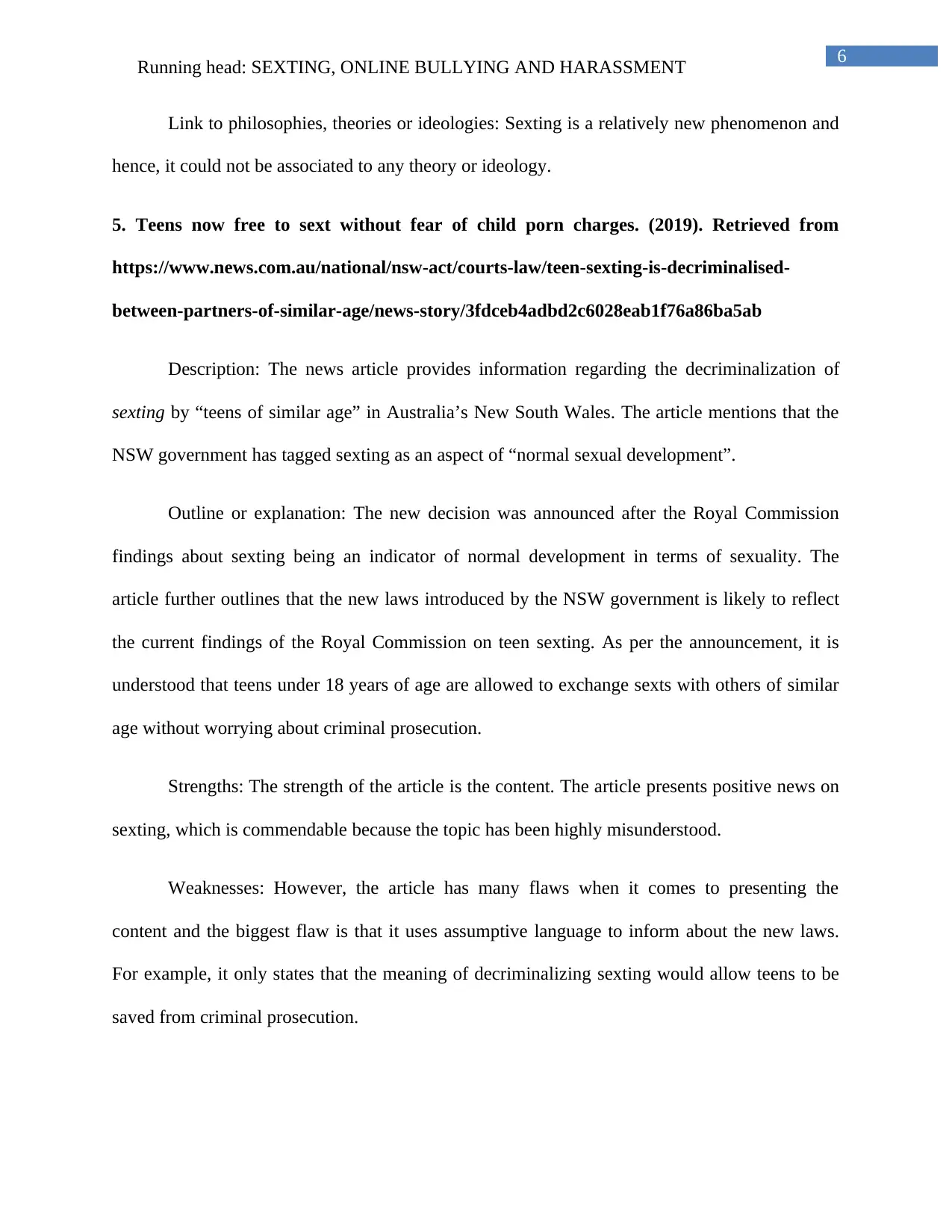
6
Running head: SEXTING, ONLINE BULLYING AND HARASSMENT
Link to philosophies, theories or ideologies: Sexting is a relatively new phenomenon and
hence, it could not be associated to any theory or ideology.
5. Teens now free to sext without fear of child porn charges. (2019). Retrieved from
https://www.news.com.au/national/nsw-act/courts-law/teen-sexting-is-decriminalised-
between-partners-of-similar-age/news-story/3fdceb4adbd2c6028eab1f76a86ba5ab
Description: The news article provides information regarding the decriminalization of
sexting by “teens of similar age” in Australia’s New South Wales. The article mentions that the
NSW government has tagged sexting as an aspect of “normal sexual development”.
Outline or explanation: The new decision was announced after the Royal Commission
findings about sexting being an indicator of normal development in terms of sexuality. The
article further outlines that the new laws introduced by the NSW government is likely to reflect
the current findings of the Royal Commission on teen sexting. As per the announcement, it is
understood that teens under 18 years of age are allowed to exchange sexts with others of similar
age without worrying about criminal prosecution.
Strengths: The strength of the article is the content. The article presents positive news on
sexting, which is commendable because the topic has been highly misunderstood.
Weaknesses: However, the article has many flaws when it comes to presenting the
content and the biggest flaw is that it uses assumptive language to inform about the new laws.
For example, it only states that the meaning of decriminalizing sexting would allow teens to be
saved from criminal prosecution.
Running head: SEXTING, ONLINE BULLYING AND HARASSMENT
Link to philosophies, theories or ideologies: Sexting is a relatively new phenomenon and
hence, it could not be associated to any theory or ideology.
5. Teens now free to sext without fear of child porn charges. (2019). Retrieved from
https://www.news.com.au/national/nsw-act/courts-law/teen-sexting-is-decriminalised-
between-partners-of-similar-age/news-story/3fdceb4adbd2c6028eab1f76a86ba5ab
Description: The news article provides information regarding the decriminalization of
sexting by “teens of similar age” in Australia’s New South Wales. The article mentions that the
NSW government has tagged sexting as an aspect of “normal sexual development”.
Outline or explanation: The new decision was announced after the Royal Commission
findings about sexting being an indicator of normal development in terms of sexuality. The
article further outlines that the new laws introduced by the NSW government is likely to reflect
the current findings of the Royal Commission on teen sexting. As per the announcement, it is
understood that teens under 18 years of age are allowed to exchange sexts with others of similar
age without worrying about criminal prosecution.
Strengths: The strength of the article is the content. The article presents positive news on
sexting, which is commendable because the topic has been highly misunderstood.
Weaknesses: However, the article has many flaws when it comes to presenting the
content and the biggest flaw is that it uses assumptive language to inform about the new laws.
For example, it only states that the meaning of decriminalizing sexting would allow teens to be
saved from criminal prosecution.
Paraphrase This Document
Need a fresh take? Get an instant paraphrase of this document with our AI Paraphraser
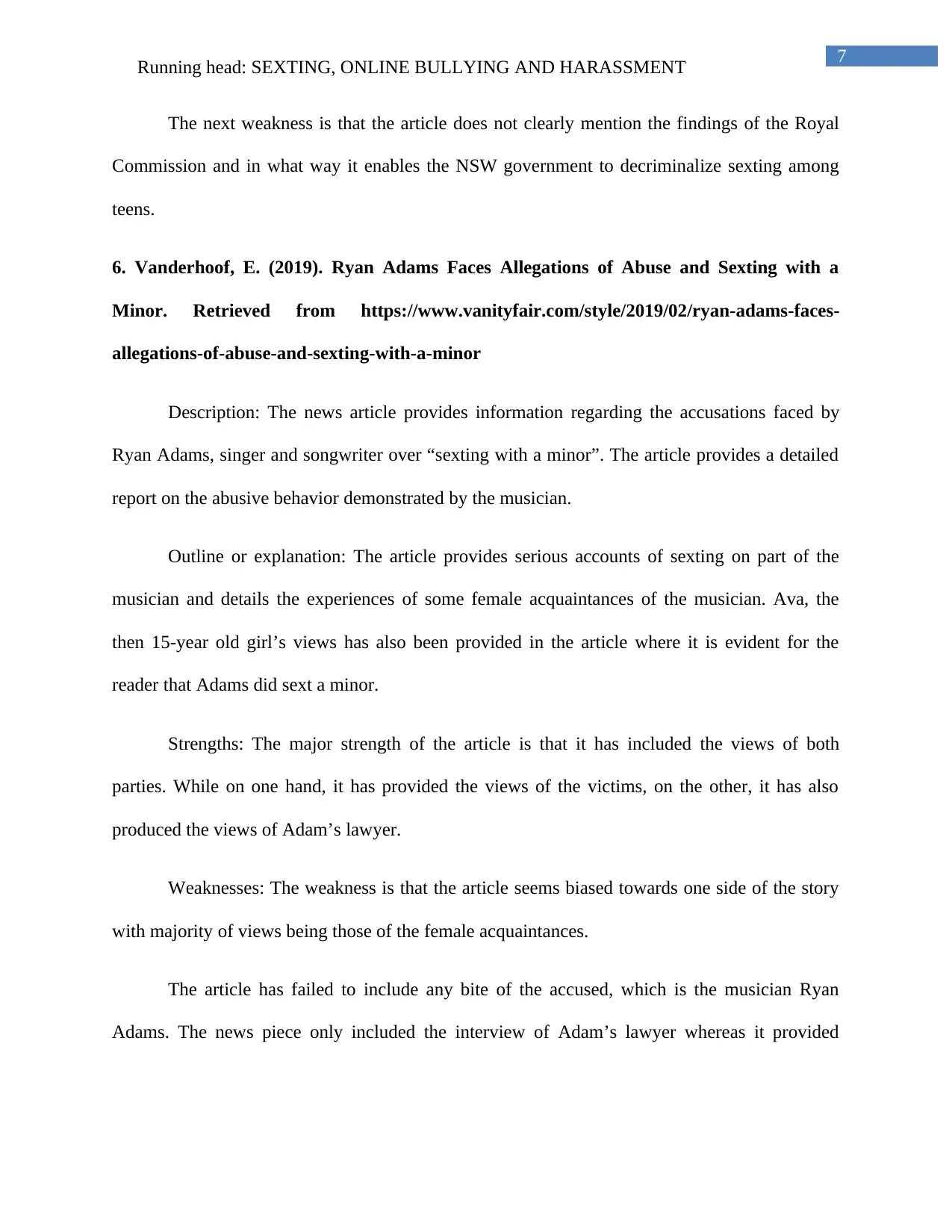
7
Running head: SEXTING, ONLINE BULLYING AND HARASSMENT
The next weakness is that the article does not clearly mention the findings of the Royal
Commission and in what way it enables the NSW government to decriminalize sexting among
teens.
6. Vanderhoof, E. (2019). Ryan Adams Faces Allegations of Abuse and Sexting with a
Minor. Retrieved from https://www.vanityfair.com/style/2019/02/ryan-adams-faces-
allegations-of-abuse-and-sexting-with-a-minor
Description: The news article provides information regarding the accusations faced by
Ryan Adams, singer and songwriter over “sexting with a minor”. The article provides a detailed
report on the abusive behavior demonstrated by the musician.
Outline or explanation: The article provides serious accounts of sexting on part of the
musician and details the experiences of some female acquaintances of the musician. Ava, the
then 15-year old girl’s views has also been provided in the article where it is evident for the
reader that Adams did sext a minor.
Strengths: The major strength of the article is that it has included the views of both
parties. While on one hand, it has provided the views of the victims, on the other, it has also
produced the views of Adam’s lawyer.
Weaknesses: The weakness is that the article seems biased towards one side of the story
with majority of views being those of the female acquaintances.
The article has failed to include any bite of the accused, which is the musician Ryan
Adams. The news piece only included the interview of Adam’s lawyer whereas it provided
Running head: SEXTING, ONLINE BULLYING AND HARASSMENT
The next weakness is that the article does not clearly mention the findings of the Royal
Commission and in what way it enables the NSW government to decriminalize sexting among
teens.
6. Vanderhoof, E. (2019). Ryan Adams Faces Allegations of Abuse and Sexting with a
Minor. Retrieved from https://www.vanityfair.com/style/2019/02/ryan-adams-faces-
allegations-of-abuse-and-sexting-with-a-minor
Description: The news article provides information regarding the accusations faced by
Ryan Adams, singer and songwriter over “sexting with a minor”. The article provides a detailed
report on the abusive behavior demonstrated by the musician.
Outline or explanation: The article provides serious accounts of sexting on part of the
musician and details the experiences of some female acquaintances of the musician. Ava, the
then 15-year old girl’s views has also been provided in the article where it is evident for the
reader that Adams did sext a minor.
Strengths: The major strength of the article is that it has included the views of both
parties. While on one hand, it has provided the views of the victims, on the other, it has also
produced the views of Adam’s lawyer.
Weaknesses: The weakness is that the article seems biased towards one side of the story
with majority of views being those of the female acquaintances.
The article has failed to include any bite of the accused, which is the musician Ryan
Adams. The news piece only included the interview of Adam’s lawyer whereas it provided

8
Running head: SEXTING, ONLINE BULLYING AND HARASSMENT
enough space for including the interviews of the victims. It is important for any piece of
advocacy that it gives equal chance for both parties to present their side of the story.
Running head: SEXTING, ONLINE BULLYING AND HARASSMENT
enough space for including the interviews of the victims. It is important for any piece of
advocacy that it gives equal chance for both parties to present their side of the story.
⊘ This is a preview!⊘
Do you want full access?
Subscribe today to unlock all pages.

Trusted by 1+ million students worldwide
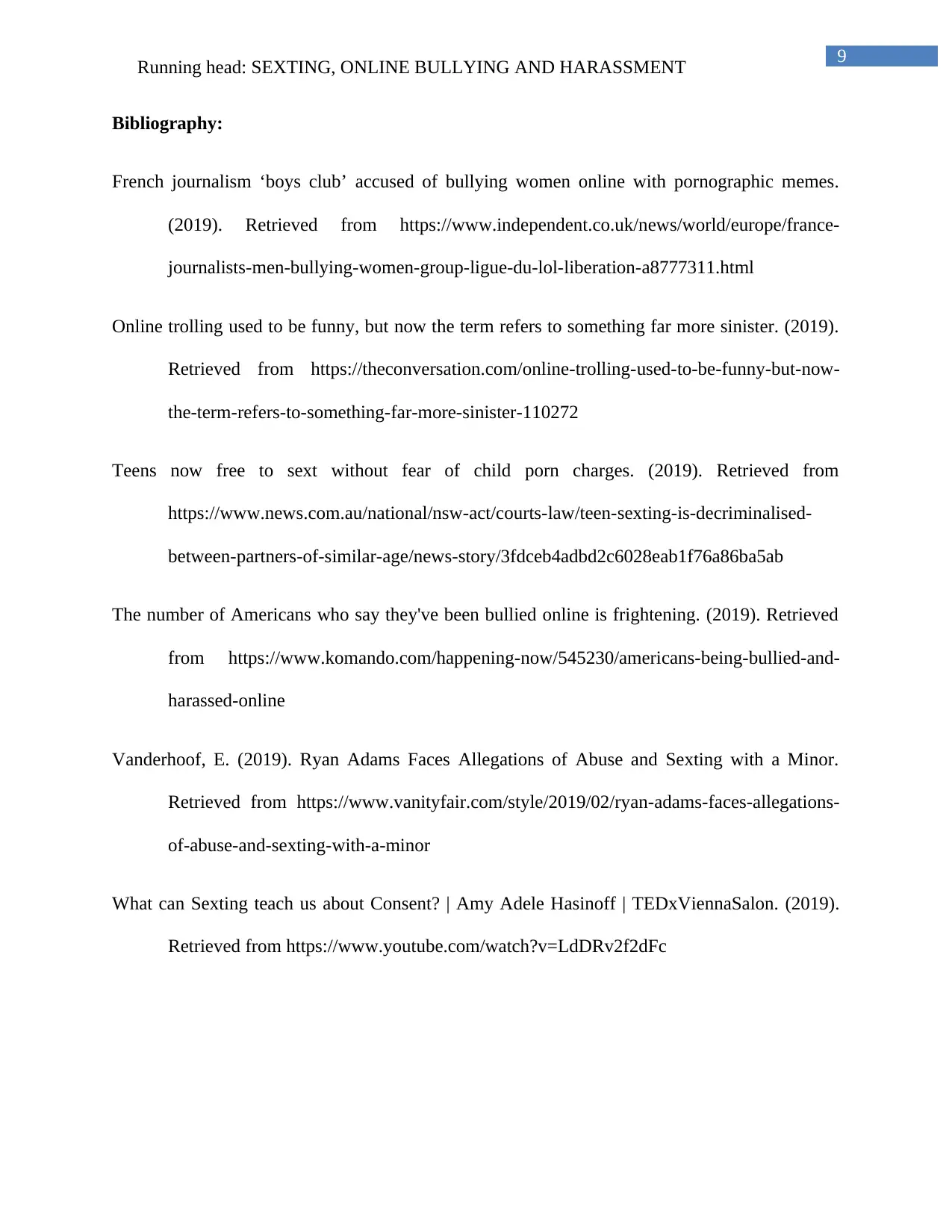
9
Running head: SEXTING, ONLINE BULLYING AND HARASSMENT
Bibliography:
French journalism ‘boys club’ accused of bullying women online with pornographic memes.
(2019). Retrieved from https://www.independent.co.uk/news/world/europe/france-
journalists-men-bullying-women-group-ligue-du-lol-liberation-a8777311.html
Online trolling used to be funny, but now the term refers to something far more sinister. (2019).
Retrieved from https://theconversation.com/online-trolling-used-to-be-funny-but-now-
the-term-refers-to-something-far-more-sinister-110272
Teens now free to sext without fear of child porn charges. (2019). Retrieved from
https://www.news.com.au/national/nsw-act/courts-law/teen-sexting-is-decriminalised-
between-partners-of-similar-age/news-story/3fdceb4adbd2c6028eab1f76a86ba5ab
The number of Americans who say they've been bullied online is frightening. (2019). Retrieved
from https://www.komando.com/happening-now/545230/americans-being-bullied-and-
harassed-online
Vanderhoof, E. (2019). Ryan Adams Faces Allegations of Abuse and Sexting with a Minor.
Retrieved from https://www.vanityfair.com/style/2019/02/ryan-adams-faces-allegations-
of-abuse-and-sexting-with-a-minor
What can Sexting teach us about Consent? | Amy Adele Hasinoff | TEDxViennaSalon. (2019).
Retrieved from https://www.youtube.com/watch?v=LdDRv2f2dFc
Running head: SEXTING, ONLINE BULLYING AND HARASSMENT
Bibliography:
French journalism ‘boys club’ accused of bullying women online with pornographic memes.
(2019). Retrieved from https://www.independent.co.uk/news/world/europe/france-
journalists-men-bullying-women-group-ligue-du-lol-liberation-a8777311.html
Online trolling used to be funny, but now the term refers to something far more sinister. (2019).
Retrieved from https://theconversation.com/online-trolling-used-to-be-funny-but-now-
the-term-refers-to-something-far-more-sinister-110272
Teens now free to sext without fear of child porn charges. (2019). Retrieved from
https://www.news.com.au/national/nsw-act/courts-law/teen-sexting-is-decriminalised-
between-partners-of-similar-age/news-story/3fdceb4adbd2c6028eab1f76a86ba5ab
The number of Americans who say they've been bullied online is frightening. (2019). Retrieved
from https://www.komando.com/happening-now/545230/americans-being-bullied-and-
harassed-online
Vanderhoof, E. (2019). Ryan Adams Faces Allegations of Abuse and Sexting with a Minor.
Retrieved from https://www.vanityfair.com/style/2019/02/ryan-adams-faces-allegations-
of-abuse-and-sexting-with-a-minor
What can Sexting teach us about Consent? | Amy Adele Hasinoff | TEDxViennaSalon. (2019).
Retrieved from https://www.youtube.com/watch?v=LdDRv2f2dFc
1 out of 10
Your All-in-One AI-Powered Toolkit for Academic Success.
+13062052269
info@desklib.com
Available 24*7 on WhatsApp / Email
![[object Object]](/_next/static/media/star-bottom.7253800d.svg)
Unlock your academic potential
Copyright © 2020–2026 A2Z Services. All Rights Reserved. Developed and managed by ZUCOL.